Charles E W Bean, Diaries, AWM38 3DRL 606/244/1 - 1916 - 1933 - Part 19
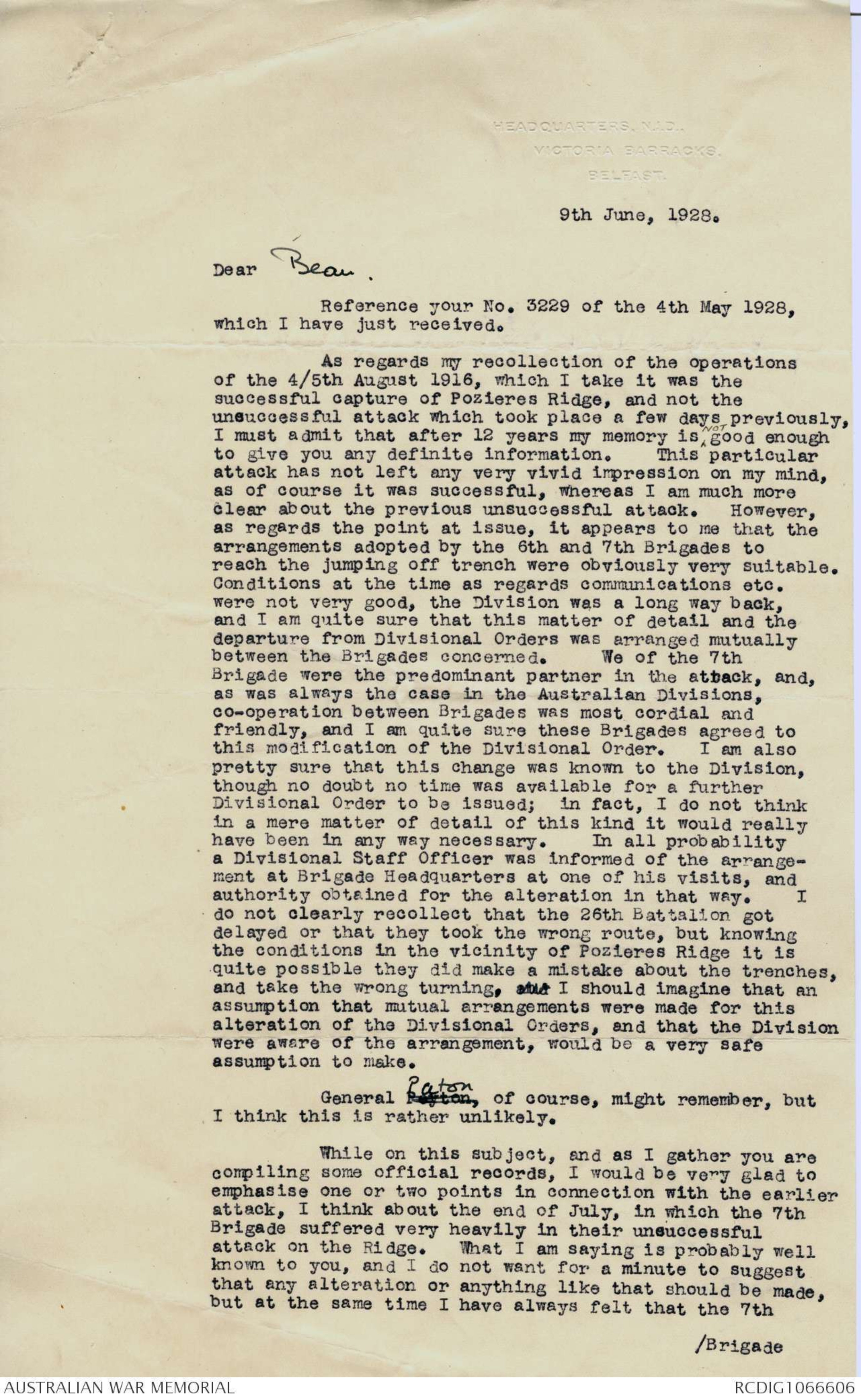
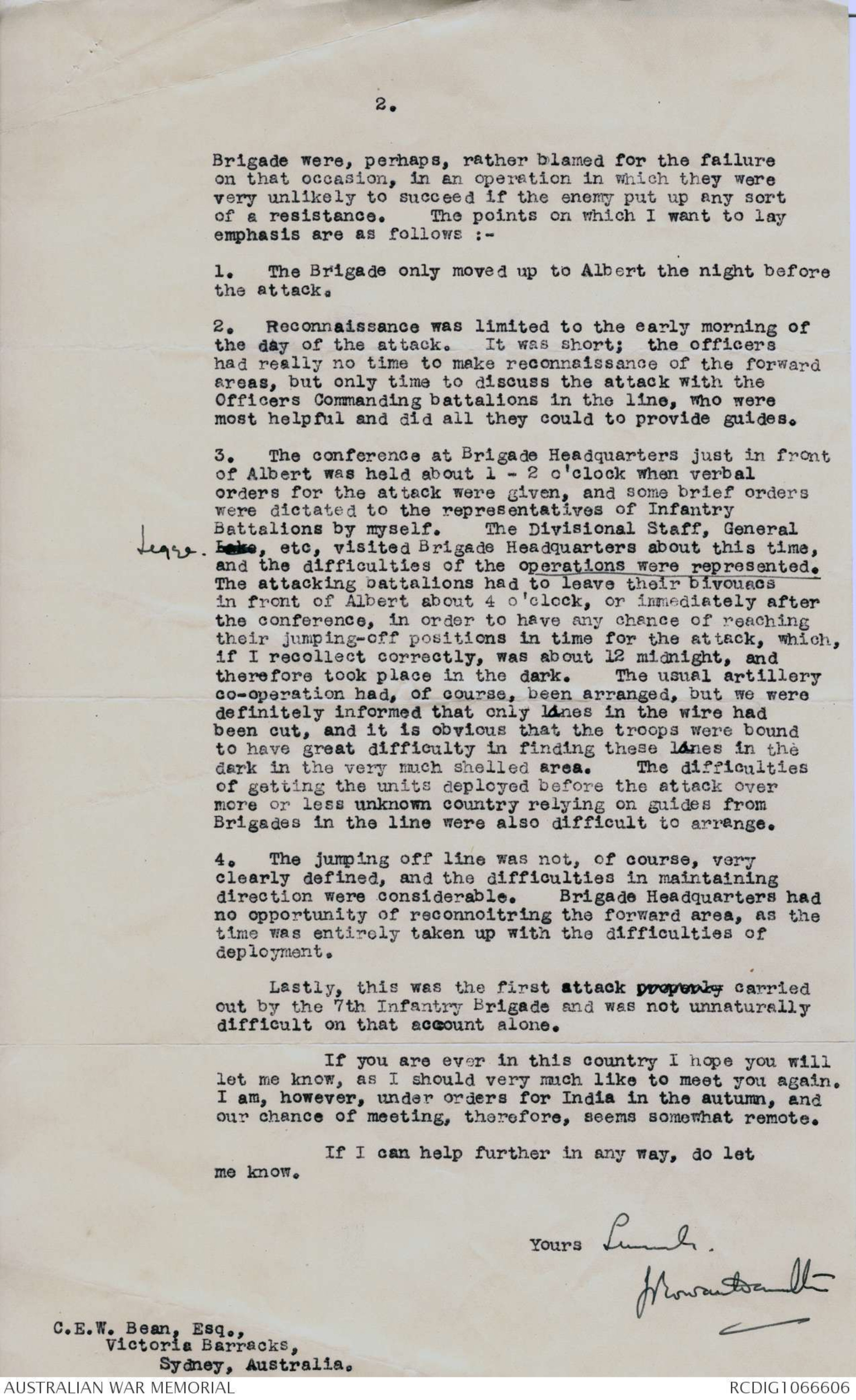
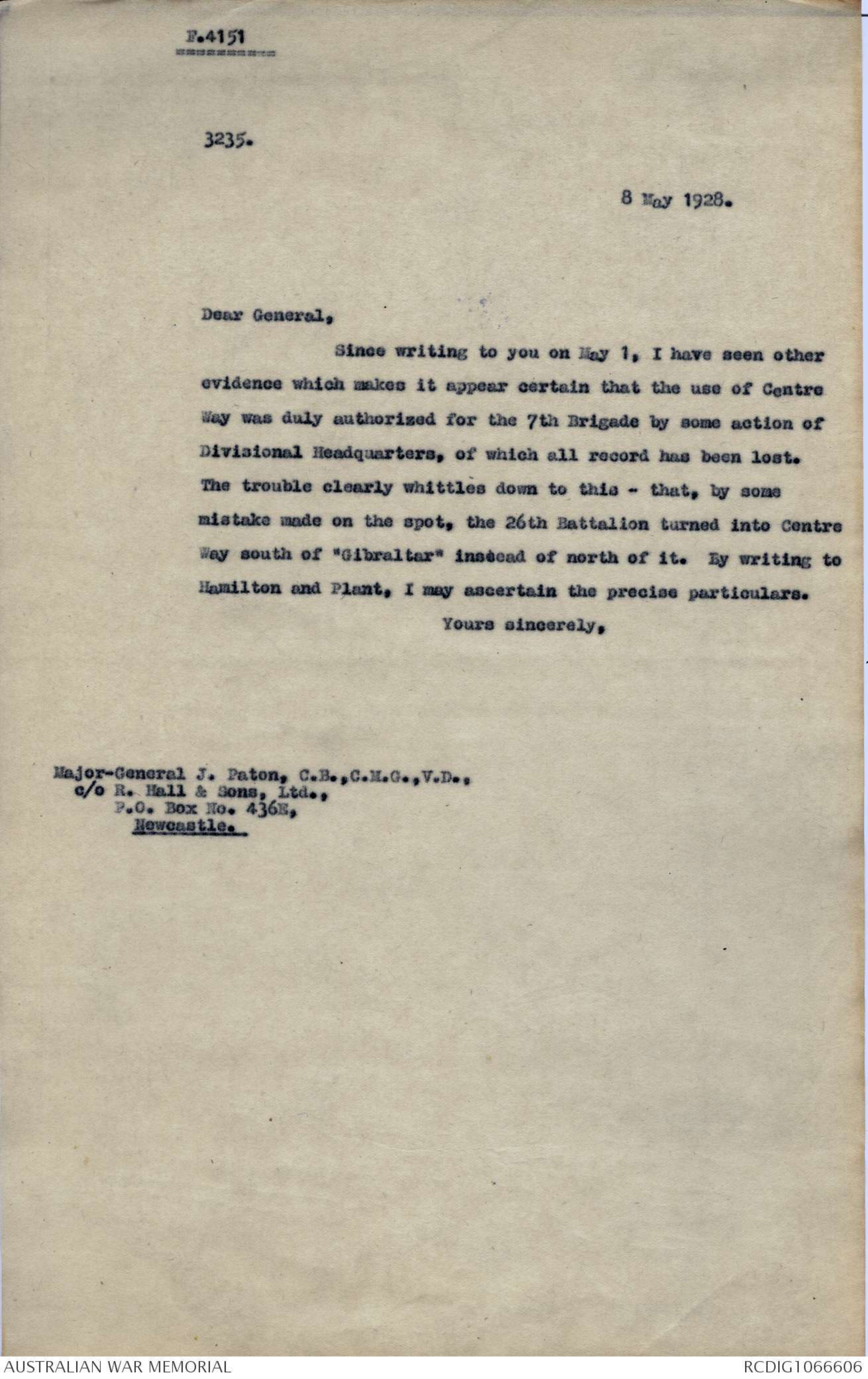
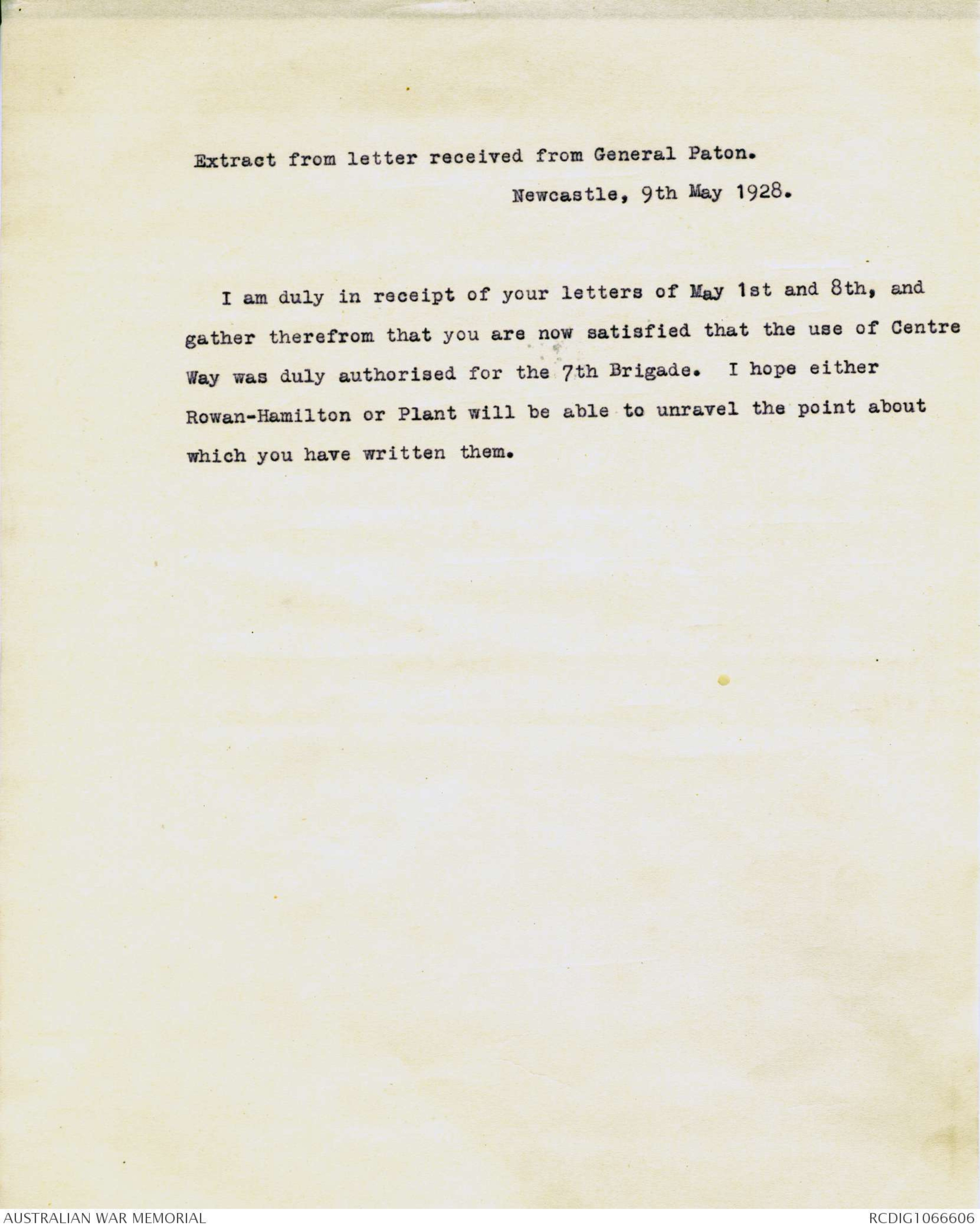
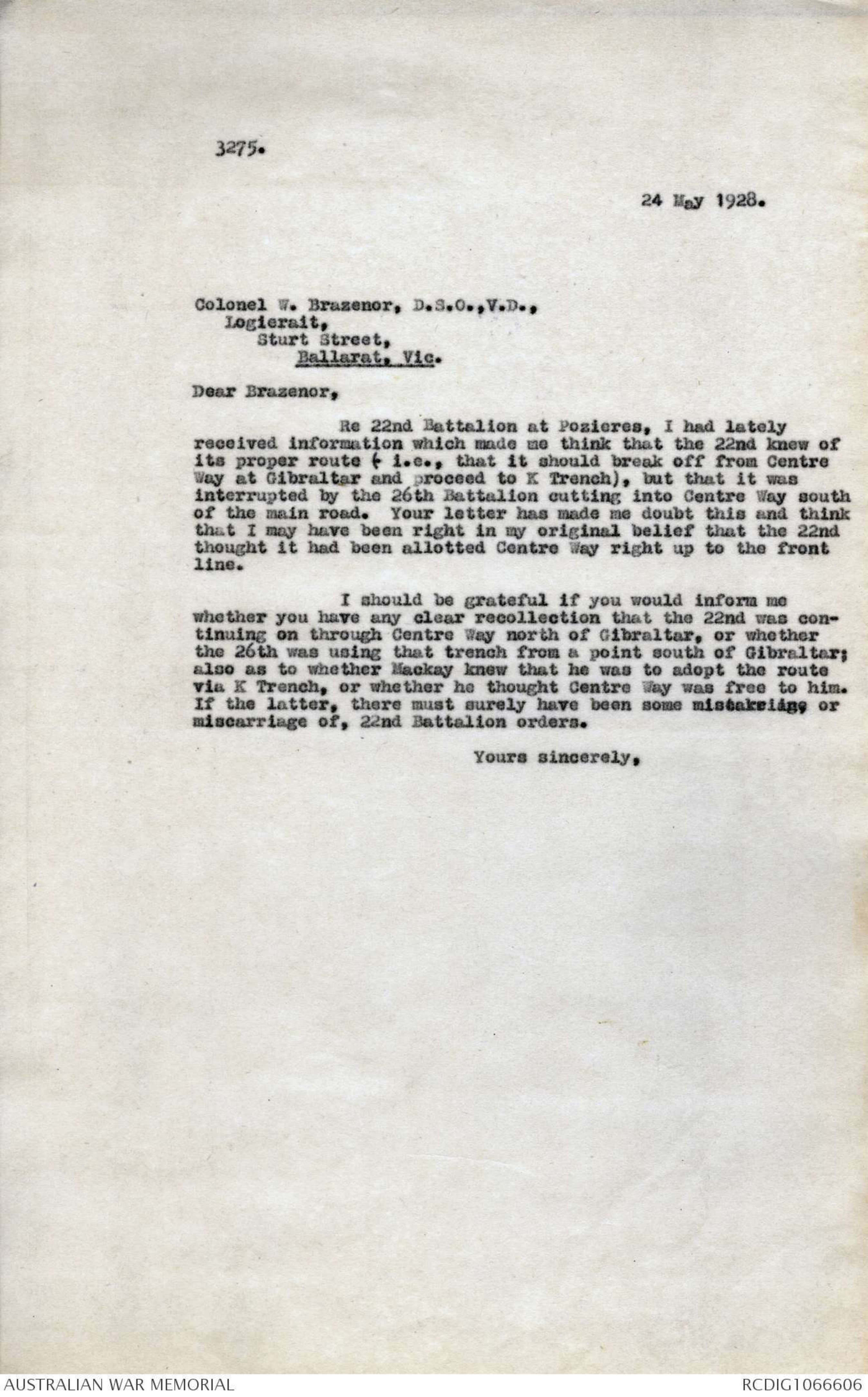
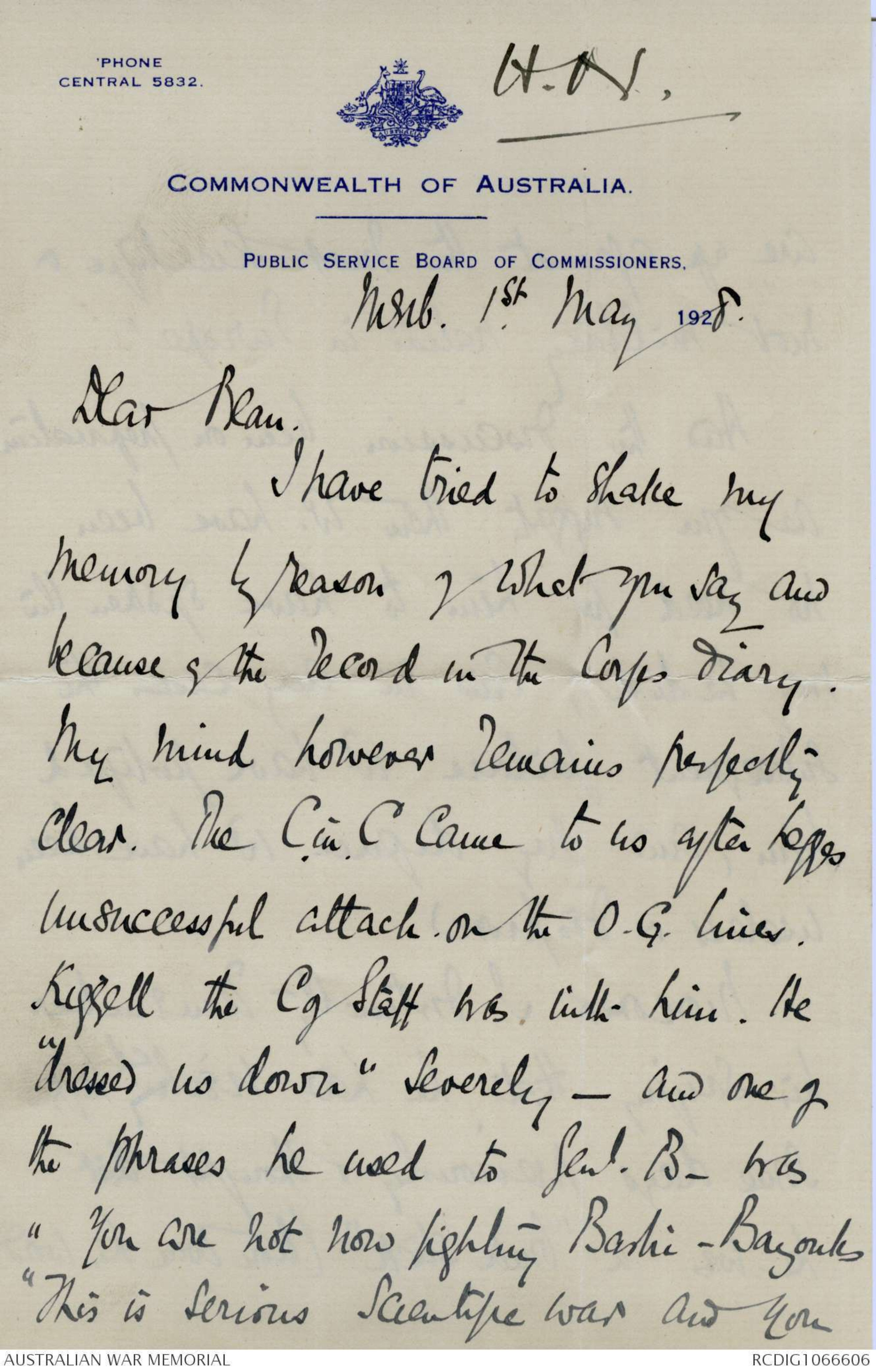
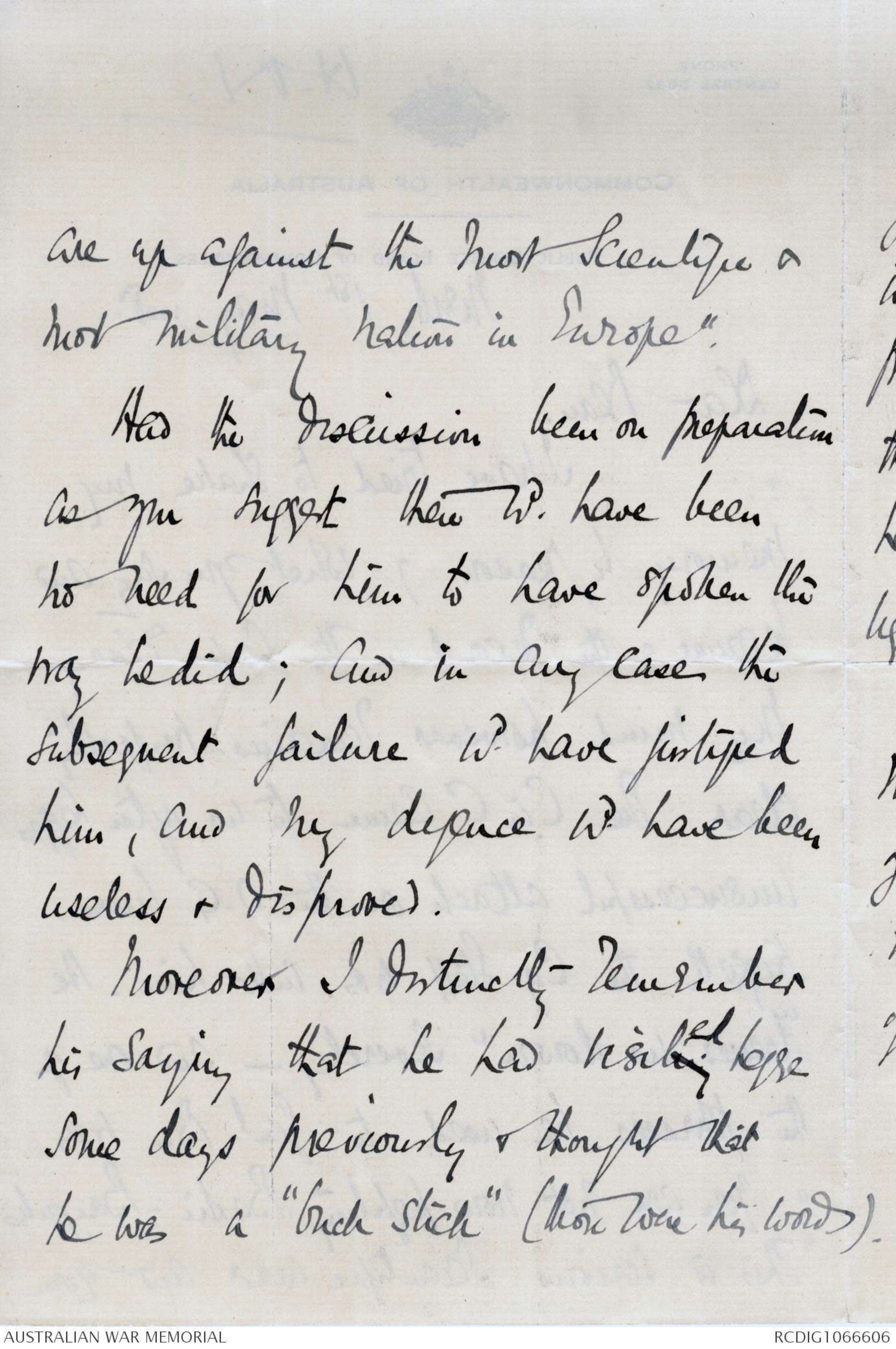
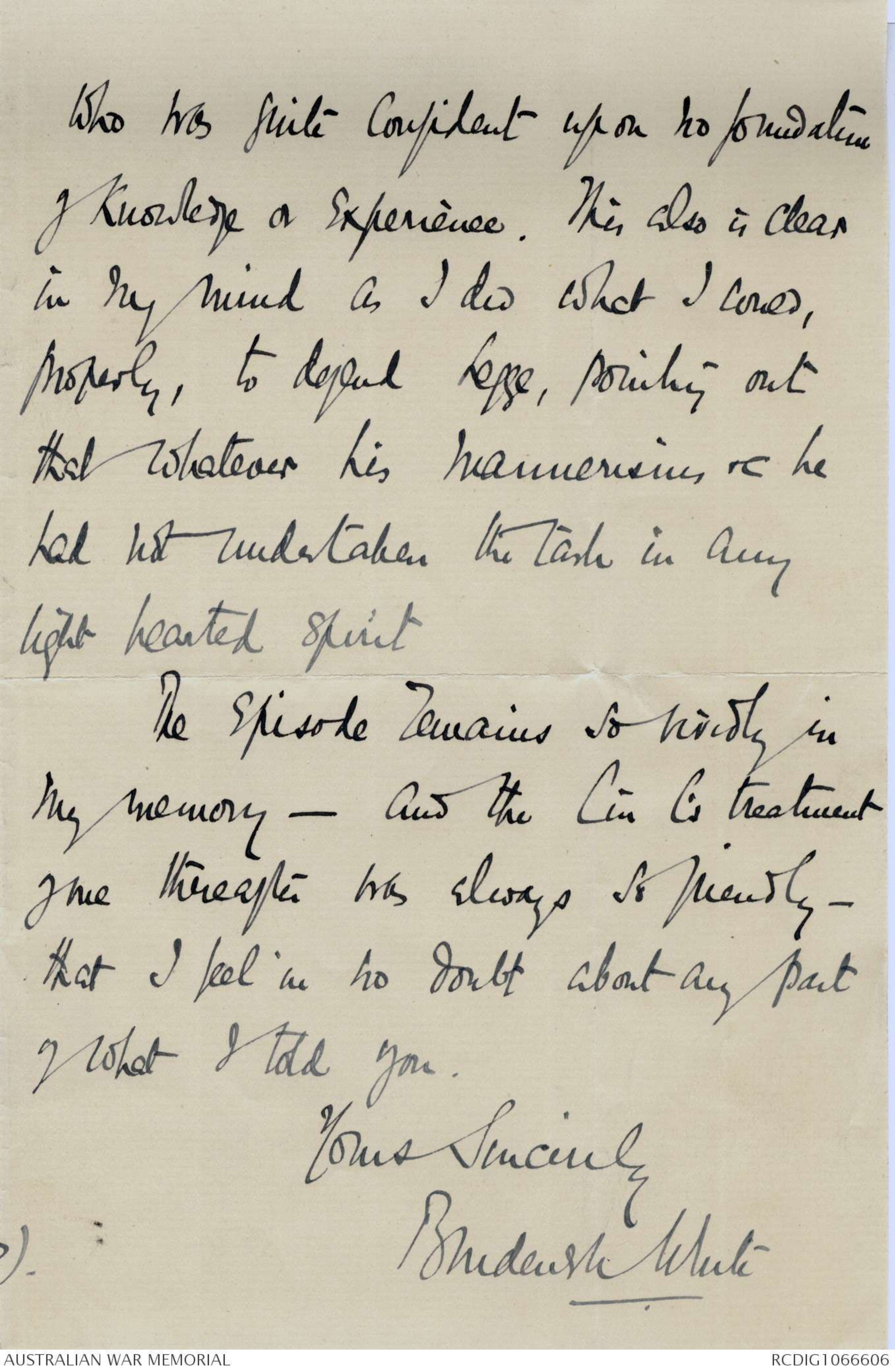
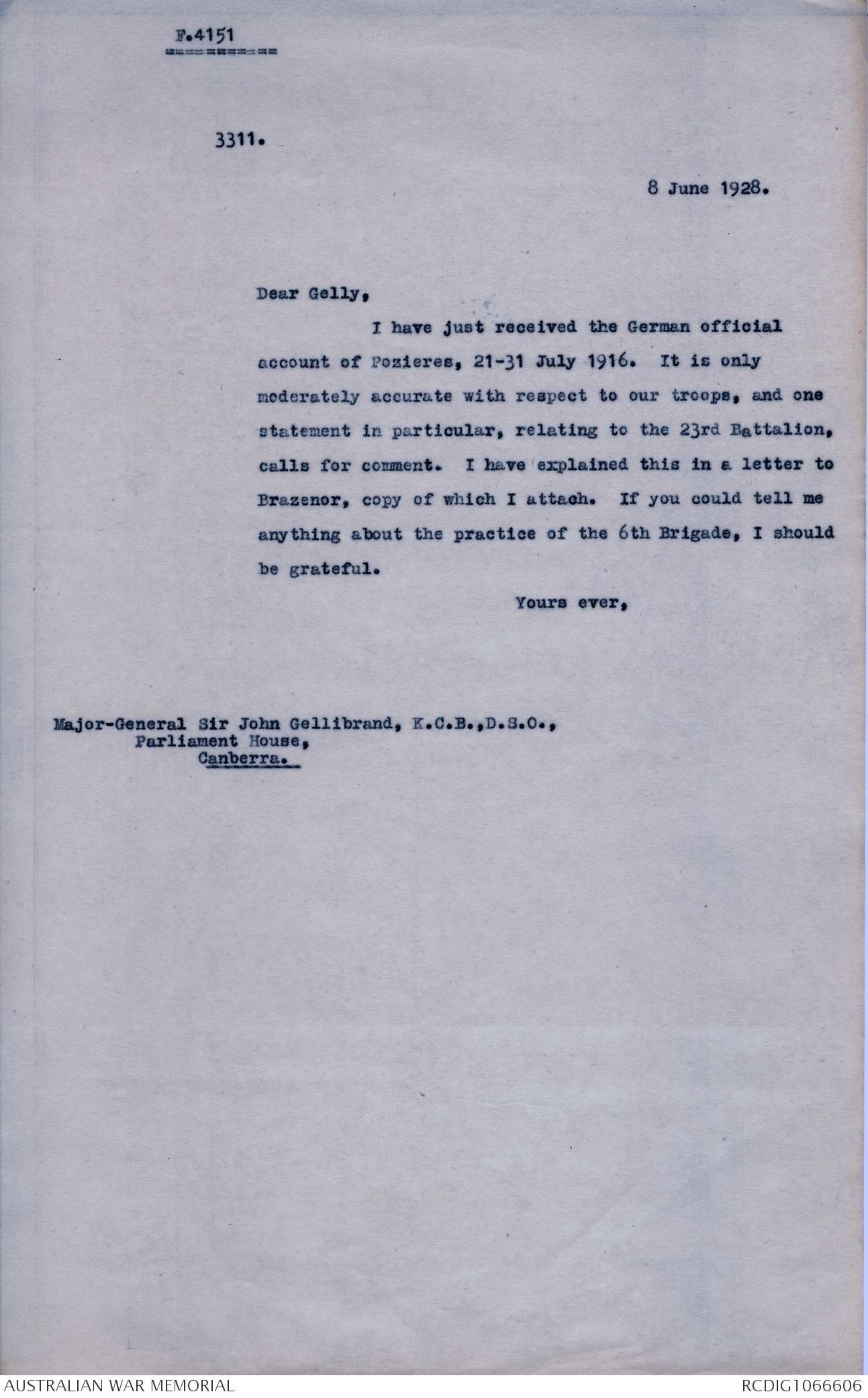
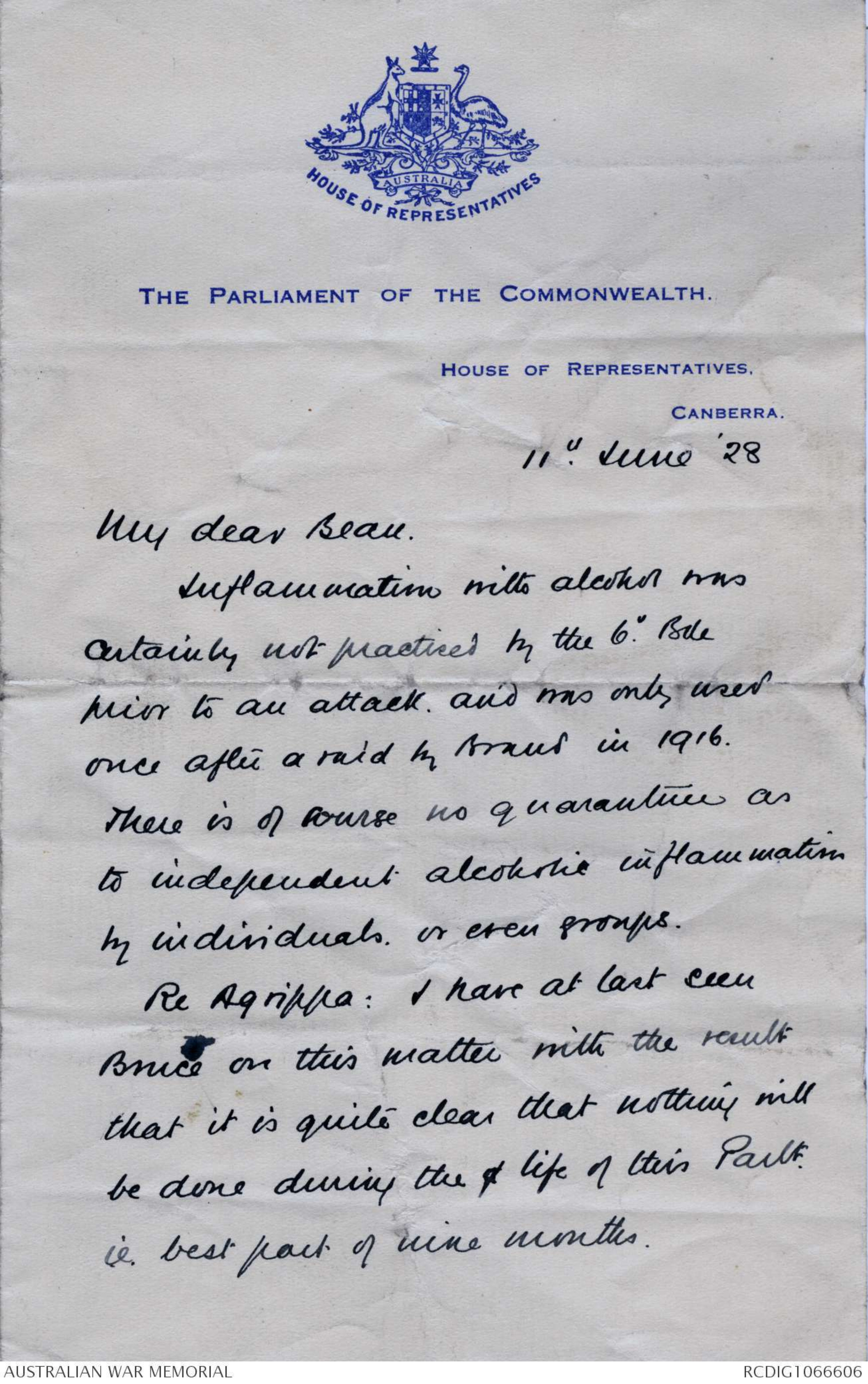
Headquarters NAD.,
VICTORIA BARRACKS.
BELFAST
9th June, 1928.
Dear Bean,
Reference your No. 3229 of the 4th May 1928,
which I have just received.
As regards my recollection of the operations
of the 4/5th August 1916, which I take it was the
successful capture of Pozieres Ridge, and not the
unsuccessful attack which took place a few days previously,
1 must admit that after 12 years my memory is, ^not good enough
to give you any definite information. This particular
attack has not left any very vivid impression on my mind,
as of course it was successful, whereas I am much more
clear about the previous unsuccessful attack. However
as regards the point at issue, it appears to me that the
arrangements adopted by the 6th and 7th Brigades to
reach the jumping off trench were obviously very suitable.
Conditions at the time as regards communications etc.
were not very good, the Division was a long way back,
and I am quite sure that this matter of detail and the
departure from Divisional Orders was arranged mutually
between the Brigades concerned. We of the 7th
Brigade were the predominant partner in the attack, and,
as was always the case in the Australian Divisions
co-operation between Brigades was most cordial and
friendly, and I am quite sure these Brigades agreed to
this modification of the Divisional Order. I am also
pretty sure that this change was known to the Division
though no doubt no time was available for a further
Divisional Order to be issued; in fact, I do not think
in a mere matter of detail of this kind it would really
have been in any way necessary. In all probability
a Divisional Staff Officer was informed of the arrangement
at Brigade Headquarters at one of his visits, and
authority obtained for the alteration in that way.
do not clearly recollect that the 26th Battalion got I
delayed or that they took the wrong route, but knowing
the conditions in the vicinity of Pozieres Ridge it is
quite possible they did make a mistake about the trenches,
and take the wrong turning. and I should imagine that an
assumption that mutual arrangements were made for this
alteration of the Divisional Orders, and that the Division
were aware of the arrangement, would be a very safe
assumption to make.
General xxxx Paton, of course, might remember, but
I think this is rather unlikely.
While on this subject, and as I gather you are
compiling some official records, I would be very glad to
emphasise one or two points in connection with the earlier
attack, I think about the end of July, in which the 7th
Brigade suffered very heavily in their unsuccessful
attack on the Ridge. What I am saying is probably well
known to you, and I do not want for a minute to suggest
that any alteration or anything like that should be made,
but at the same time I have always felt that the 7th
/ Brigade
2.
Brigade were, perhaps, rather blamed for the failure
on that occasion, in an operation in which they were
very unlikely to succeed if the enemy put up any sort
of a resistance. The points on which I want to lay
emphasis are as follows:-
1. The Brigade only moved up to Albert the night before
the attack.
2. Reconnaissance was limited to the early morning of
the day of the attack. It was short; the officers
had really no time to make reconnaissance of the forward
areas, but only time to discuss the attack with the
Officers Commanding battalions in the line, who were
most helpful and did all they could to provide guides.
3. The conference at Brigade Headquarters just in front
of Albert was held about 1 - 2 o'clock when verbal
orders for the attack were given, and some brief orders
were dictated to the representatives of Infantry
Battalions by myself. The Divisional Staff, General
Legge, etc, visited Brigade Headquarters about this time,
and the difficulties of the operations were represented.
The attacking battalions had to leave their bivouacs
in front of Albert about 4 o'clock, or immediately after
the conference, in order to have any chance of reaching
their jumping-off positions in time for the attack, which,
if I recollect correctly, was about 12 midnight, and
therefore took place in the dark. The usual artillery
co-operation had, of course, been arranged, but we were
definitely informed that only lines in the wire had
been cut, and it is obvious that the troops were bound
to have great difficulty in finding these lines in the
dark in the very much shelled area. The difficulties
of getting the units deployed before the attack over
more or less unknown country relying on guides from
Brigades in the line were also difficult to arrange.
4. The jumping off Line was not, of course, very
clearly defined, and the difficulties in maintaining
direction were considerable. Brigade Headquarters had
no opportunity of reconnoitring the forward area, as the
time was entirely taken up with the difficulties of
deployment.
Lastly, this was the first attack propenty carried
out by the 7th Infantry Brigade and was not unnaturally
difficult on that account alone.
If you are ever in this country I hope you will
let me know, as I should very much like to meet you again.
I am, however, under orders for India in the autumn, and
our chance of meeting, therefore, seems somewhat remote.
If I can help further in any way, do let
me know.
Yours sincerely
J Rowan Hamilton
C.E.W. Bean, Esq.,
Victoria Barracks
Sydney, Australia.
F.4151
3235.
8 May 1928.
Dear General,
Since writing to you on May 1, I have seen other
evidence which makes it appear certain that the use of Centre
May was duly authorized for the 7th Brigade by some action of
Divisional Headquarters, of which all record has been lost.
The trouble clearly whittles down to this - that, by some
mistake made on the spot, the 26th Battalion turned into Centre
Way south of "Gibraltar"instead of north of it. By writing to
Hamilton and Plant, I may ascertain the precise particulars.
Yours sincerely,
Major-General J. Paton, C.B., C.M.G., V.D.,
c/o R. Hall & Sons, Ltd.,
P.O. Box No. 436E,
Newcastle
Extract from letter received from General Paton.
Newcastle, 9th May 1928.
1 am duly in receipt of your letters of May 1st and 8th, and
gather therefrom that you are now satisfied that the use of Centre
Way was duly authorised for the 7th Brigade. I hope either
Rowan-Hamilton or Plant will be able to unravel the point about
which you have written them.
3275.
24 May 1928.
Colonel W. Brazenor, D.S.O,V.D.,
Logierait
Sturt Street,
Ballarat, Vic.
Dear Brazenor,
Re 22nd Battalion at Pozieres, I had lately
received information which made me think that the 22nd knew of
its proper route (i.ec, that it should break off from Centre
Way at Gibraltar and proceed to K Trench), but that it was
interrupted by the 26th Battalion cutting into Centre Way south
of the main road. Your letter has made me doubt this and think
that I may have been right in my original belief that the 22nd
thought it had been allotted Centre Way right up to the front
line.
I should be grateful if you would inform me
whether you have any clear recollection that the 22nd was
continuing on through Centre Way north of Gibraltar, or whether
the 26th was using that trench from a point south of Gibraltar;
also as to whether Mackay knew that he was to adopt the route
via K Trench, or whether he thought Centre Way was free to him.
if the latter, there must surely have been some mistakings or
miscarriage of, 22nd Battalion orders.
Yours sincerely,
H.N
'PHONE
CENTRAL 5832.
COMMONWEALTH OF AUSTRALIA.
PUBLIC SERVICE BOARD OF COMMISSIONERS.
Melb. 1st May 1928.
Dear Bean.
I have tried to shake my
memory by reason of what you say and
because of the record in the Corps Diary.
My mind however remains perfectly
clear. The C in C came to us after Legges
unsuccessful attack. on the O.G. lines
Kiggell the Co Staff was. with him. He
"dressed us down" Severely - and one of
the phrases he used to Genl. B. - was
"You are not now fighting Bashie - Bayonets
"This is serious scientific war and you
are up against the most Scientific &
most military nation in Europe".
Had the discussion been on preparation
as you suggest there wd. have been
ho need for him to have spoken the
way he did; And in any case the
subsequent failure wd have justified
him, and my defence wd have been
useless & disproved.
Moreover I distinctly remember
his saying that he had visited Legge
some days previously & thought that
he was a "touch stuck" (those were his words).
who was quite confident upon no ? foundation
of knowledge or experience. This also is clear
in my mind as I did what I could,
properly, to defend Legge, pointing out
that whatever his mannerisms &c he
had not undertaken the task in any
light hearted spirit
The episode remains so vividly in
my memory - and the C in C's treatment
of me thereafter was always so friendly -
that I feel in no doubt about any part
of what I told you
Yours Sincerely
Brenden McWhite
F.4151
3311.
8 June 1928.
Dear Gelly,
I have just received the German official
account of Pozieres, 21-31 July 1916. 1t is only
moderately accurate with respect to our troops, and one
statement in particular, relating to the 23rd Battalion,
calls for comment. I have explained this in a letter to
Brazenor, copy of which I attach. If you could tell me
anything about the practice of the 6th Brigade, I should
be grateful.
Yours ever,
Major-General Sir John Gellibrand, K.C.B.,D.S.O,
Parliament House
Canberra
AUSTRALIA
HOUSE OF REPRESENTATIVES.
THE PARLIAMENT OF THE COMMONWEALTH.
HOUSE OF REPRESENTATIVES.
CANBERRA.
11th June 28
My dear Bean.
Inflammation with alcohol was
certainly not practiced by the 6th. Bde
prior to an attack and was only used
once after a raid by Brand in 1916.
There is of course no guarantee as
to independent alcoholic inflammation
by individuals. or even groups.
Re Agrippa: I have at last seen
Bruce on this matter with the result
that it is quite clear that nothing will
be done during the & life of this Parlt.
ie. best part of nine months.
 Sam scott
Sam scottThis transcription item is now locked to you for editing. To release the lock either Save your changes or Cancel.
This lock will be automatically released after 60 minutes of inactivity.